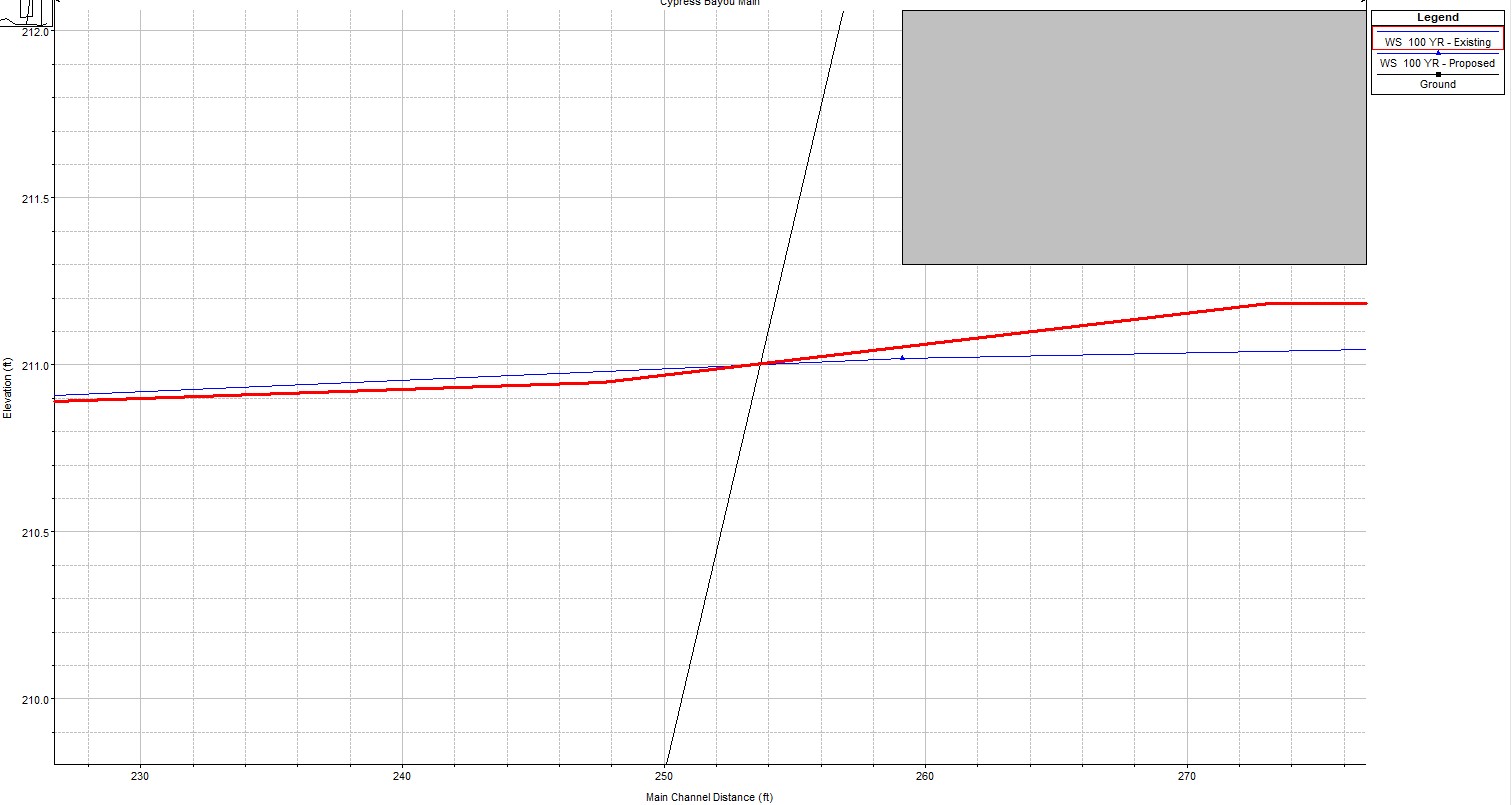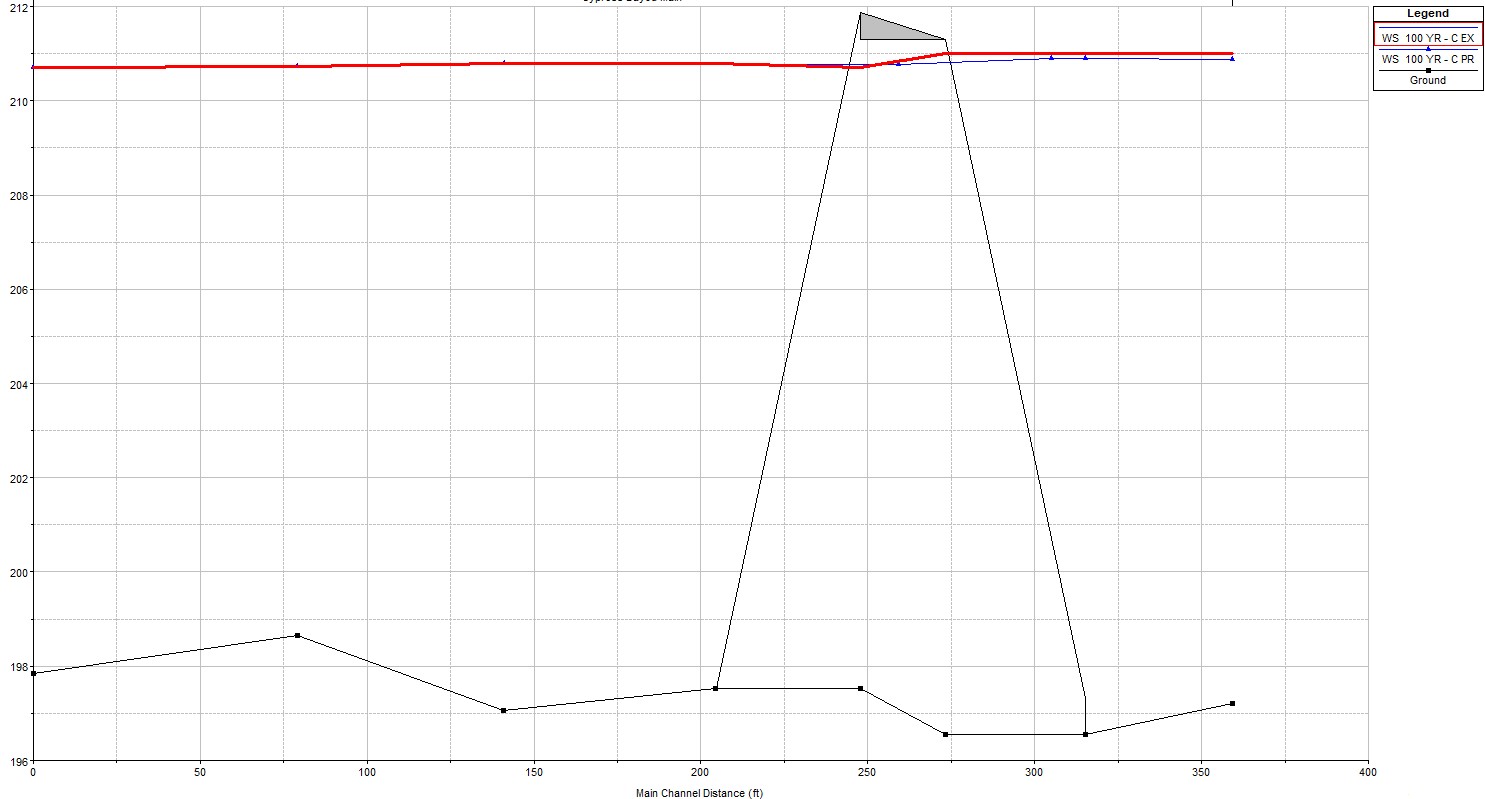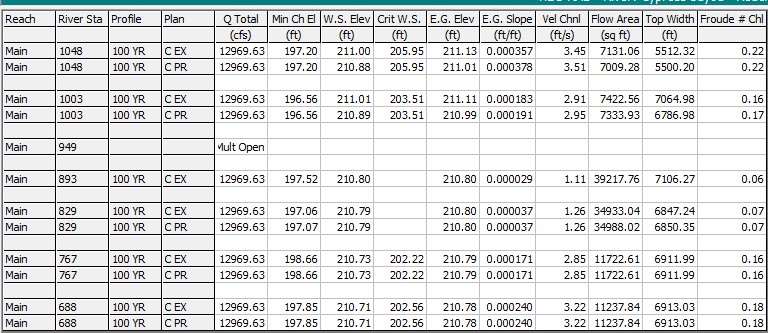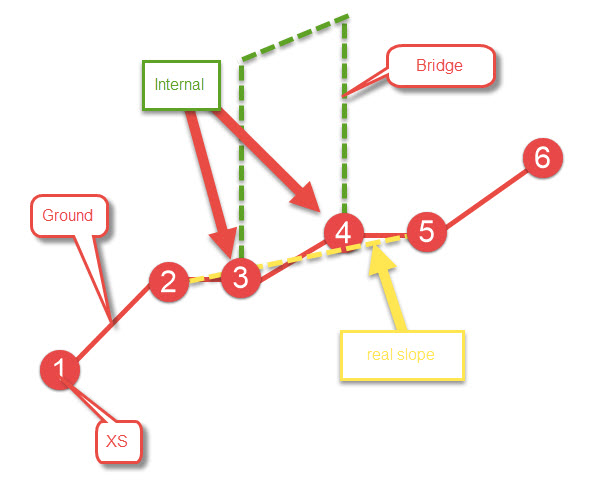Welcome to the RAS Solution › Forums › HEC-RAS Help › Rise In Between X-secs
- This topic has 10 replies, 142 voices, and was last updated 5 years, 10 months ago by mlc3n3.
-
AuthorPosts
-
April 16, 2020 at 11:12 pm #7651mlc3n3Participant
Hello,
I’m modeling a proposed bridge shortly downstream of an existing. The new bridge has a longer span, abutment excavation, and therefore a larger conveyance area. The new bridge is slightly higher in elevation.
The goal is to create a “no rise” scenario. After modeling and analysis, at all x-secs the proposed WSE is below or equal to the existing WSE. However, there are points in between x-secs where the proposed WSE is higher than the existing. It kind of cuts the corner. This is because the water surface profile is changing shapes and slope. Is this “rise” normal or ok?
See attached picture just to compare this type of “rise” during the Q100 storm event.
Let me know if you have any questions.April 30, 2020 at 10:57 pm #12778GoSparkyParticipantCan you show more of the profile with the xsec points marked for both profiles?
May 1, 2020 at 12:36 am #12779mlc3n3ParticipantI can’t get all of the nodes to have labels right now.
As mentioned before, the proposed (PR) WSE is below existing (EX) WSE upstream of the bridge. PR ties into EX downstream of the bridge. However in the middle the PR water surface cuts corner, per se. The behavior happens during all typical storm events. Doesn’t even show up on the summary profile table.
See below the WSP. X-secs are located at the black nodes on the bottom. The EX model has an extra x-sec so a nearest downstream x-sec isn’t too far away. Extra x-secs is at the 5th downstream node.
Hope this clarifies!
May 1, 2020 at 1:11 am #12780GoSparkyParticipantIt looks to me like the inflection points are at the bridge internal cross sections, BR U and BR D. Is that not the case?
May 1, 2020 at 4:45 pm #12782cameronParticipantHave you tried modifying the internal cross-sections so they have a slope to them?
May 1, 2020 at 4:45 pm #12781mlc3n3ParticipantFor this project I think that is the case. I’ve seen this type of rise in other projects different this this. But in general where the WSP cuts a corner but the rise doesn’t appear in the table. In those other projects I’ve worked around it by changing cross section locations or shapes.
Have any experience with this phenomenon happening? Any way to prevent or eliminate it?
May 1, 2020 at 4:49 pm #12783mlc3n3ParticipantHi Cameron,
Slope? Could you clarify?
Slope parallel to the river reach? Or slope perpendicular to river reach and parallel to road/bridge crossing?
If this was applied on the physical site are you suggesting a berm or excavation?
May 2, 2020 at 4:25 am #12784cameronParticipantWhen you make a bridge/culvert, the program creates two internal cross-sections which are exact copies of the bounding cross-sections including inverts. This means you have a flat (zero slope) area through the structure and does not depict reality where there is a slope through the bridge/culvert. So what you can do is adjust the internal cross-sections to follow the slope between the upstream and downstream cross-sections and not have the flat (zero slope) section.
I have seen in multiple cases when trying to do a no rise and having similar issues that just by lowering the upstream internal cross-section and raising the downstream internal cross-section to have a none flat slope the issue go away.
May 4, 2020 at 5:09 pm #12785mlc3n3ParticipantCameron,
Ok that make sense! Do you suggest moving all points of the entire x-secs? Or just the internal x-secs points under or at the bridge opening and crossing the river reach?
Your last sentence??? Lower the upstream and rise the downstream? I would think it should be the other way around?
Thanks
May 5, 2020 at 3:51 am #12786cameronParticipantMay 5, 2020 at 8:24 pm #12787mlc3n3ParticipantCameron,
I see what your saying! I was thinking about a general case, but your great diagram does specifically apply to my case. I will try this!
You are always very helpful!
Thank you so much!
-
AuthorPosts
- You must be logged in to reply to this topic.



